WRITTEN BY: Zenani Sizane
4C hair is often celebrated for its unique texture, strength, and versatility, but it also comes with its own set of challenges. Characterized by tight, coiled curls that can range from soft to tightly packed, 4C hair can sometimes be misunderstood or misrepresented in the beauty world. In this post, we’ll explore what makes 4C hair so special, how to care for it, and tips to enhance its natural beauty. Whether you’re new to embracing your coils or have been on this journey for years, this guide will help you fully appreciate the beauty of 4C hair.
What is Type 4C Hair
All afro-hair is not the same; most Black people generally have what is called type 4c hair, which is usually kinky, wiry, fragile, and has tight curls rather than being straight. There are various groups your hair type can fall into depending on the look, feel, and texture. Type 4 hair is the driest hair type, which is why it is fragile. Type 4 hair is also prone to shrinkage and requires much more care to avoid breakage, unlike other types of hair. This is why there is a general misconception that type 4 hair doesn’t grow long.
There are 3 groups of type 4 hair, and type 4c hair in particular is the kinkiest of them all. Type 4c hair has no defined curl pattern, and it can appear a lot shorter than it actually is due to its 70% shrinkage when it is not stretched. Type 4c hair ranges from fine, soft, and thin to coarse, and its densely packed hair strands can look very similar to type 4b hair. The difference is that 4c is tightly packed and experiences less definition. Type 4c hair is the most fragile hair of all and requires a lot more care.
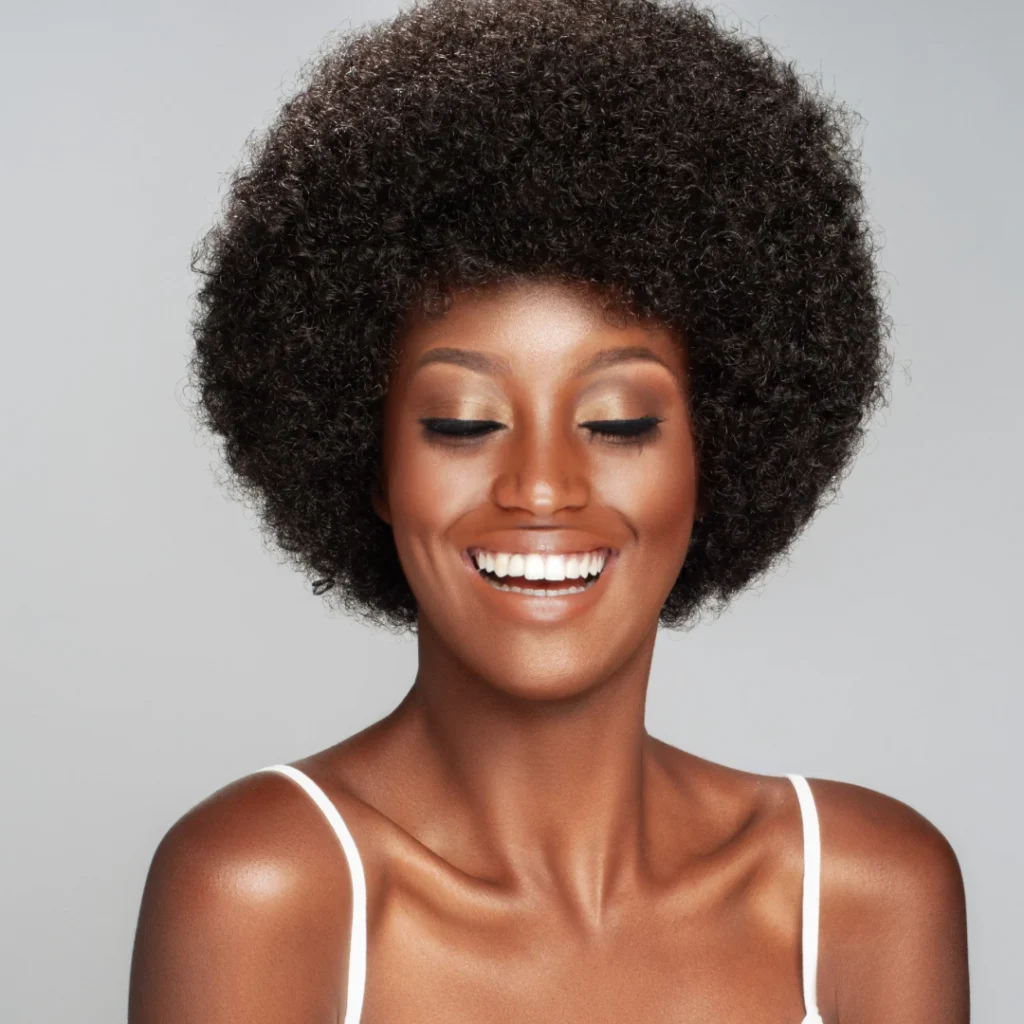
RELATED POST: Hair Types: Everything you need to know and how to determine your type.
How To Identify Type 4C Hair?
The key to identifying type 4c hair is the lack of definition in its curl pattern. Type 4c hair is tightly coiled in its raw state and, as it has no defined curl pattern, coils must be defined by styles such as twisting or braiding. Type 4c hair is the most coily out of all the hair types.
The most common attribute of 4c hair is shrinkage, which is when hair appears shorter than it actually is. Most 4c natural hair has 70% shrinkage or more. Though dense in volume, 4c hair strands are very fragile and prone to breakage, dryness, and frizz. This is partially because the kinky strands that make up 4c hair have a hard time transferring their natural oils from root to tip.
The volume that comes with type 4 hair is caused by its unique curl pattern. Though we use the phrase “curl pattern” to describe the texture of type 4, the term coily better describes its texture. Type 4c hair strands are amazingly dense and resistant, making it hard to go from their natural texture to wavy or straight. The kinks and coils of type 4c hair do not lose shape or definition.
Here’s How To Pinpoint Type 4C Hair:
- When wet, 4c hair shrinks significantly more than other hair types, appearing much shorter than when dry.
- Prone to tangles.
- The curls are very small and tightly packed together, almost resembling a “Z” pattern.
- Very coarse
- Without proper styling products, 4c hair can appear frizzy and lack visible curl definition.
- Due to the tight curl pattern, 4c hair tends to be naturally dry and needs regular moisturizing.
The Challenges Faced With Type 4C Hair
- Shrinkage
4c hair has remarkable shrinkage capabilities, often appearing shorter than it actually is due to its coily nature. The shrinkage can make it difficult to wear hair long or in an afro. Protective hairstyles like braids, twists, or bantu knots can help stretch the hair and reduce shrinkage. It is advised to use stretching methods like mini twists or African threading, as they help to elongate your curls without doing much harm.
- Moisture Retention
Due to type 4c hair’s tightly coiled nature, the hair’s natural oils struggle to travel down the hair shaft, making your hair more prone to dryness. It is crucial to prioritize moisture and hydration in your hair care routine. Regularly deep conditioning your hair can help to replenish and nourish the hair.
- Breakage
Breakage is another common problem among people with 4c hair. Being naturally prone to dryness, 4c hair may break easily, especially when it lacks moisture and proper care. To minimize breakage and promote healthy hair growth. Be aware of the kind of hairstyles you install into your hair as well as fabrics, as they can contribute to breakage.
- Tangles
Type 4c hair tends to tangle and knot up frequently, if not all the time, due to its thick, coarse, and curly nature. Tangles lead to breakage and even thinning that hinder hair growth and make it look dull and lifeless. It is necessary to detangle your hair regularly.
- Itching
Itching in 4c hair can be quite frustrating and uncomfortable. Itching may be the result of having a dry scalp due to product buildup, allergic reactions, or scalp conditions such as dandruff. All these can lead to irritation and itching. Make sure to moisturize your scalp regularly and implement proper hair care practices. Aloe vera and tea tree oil are effective natural remedies for an itchy scalp.
How To Care For Type 4C Hair
Moisturize Regularly
4C hair needs ample moisture to stay healthy and prevent breakage. Use a hydrating shampoo and conditioner, and follow up with a leave-in conditioner or hair butter. A hydrating mask once or twice a week will keep your hair moisturized.
Use the LOC method
The LOC method is the best way to keep 4C hair moisturized since it involves hydrating the hair with a water-based product, sealing it with oil, and finally closing its cuticles with cream to lock in moisture.
L = leave-in conditioner
O = oil
C = cream
Detangle Gently
Detangle 4C hair gently, preferably when wet and with moisturizing products, to minimize breakage. Detangle your hair gently, starting from the ends and working your way up. Use a wide-tooth comb or your fingers to detangle.
Protect from Heat
Heat styling can damage type 4c hair. Use heat protectant when styling 4C hair with heat tools, and consider heat-free styling options.
Consider Low Manipulation Styles
Opt for styles that require less styling and handling.Popular styles include twists, braids, and buns. Protective styles help 4C hair retain length by reducing exposure to environmental stressors and daily handling.
Don’t Neglect Your Scalp
A healthy scalp is essential for healthy hair growth. Stimulate blood circulation to the scalp with regular massages, using your hands or a tool like a scalp massager. This promotes a healthy scalp environment for optimal hair growth.
Nighttime Care
Wear a satin or silk scarf, or use a satin bonnet, to protect your hair while sleeping. A silk/satin pillowcase or hair wrap can help keep 4C hair moisturized and prevent breakage by reducing friction between the hair and the pillowcase. Satin is a smoother fabric than cotton, which can reduce hair tangling and breakage.
Be Patient
4C hair requires patience and consistency. It takes time to find a routine that works best for your hair. Embracing your 4C hair is a deeply personal journey—one that reveals new things about yourself along the way and you will grow to truly appreciate and love your amazing coils.
What Are The Best Hairstyles And Cuts For Type 4C Hair
- African Threading
African threading is done with a thread. The thread is wrapped around a section of strands from root to tip in a corkscrew manner. This hairstyle is a protective style that helps to retain length. When the hair is wrapped, it leads to less manipulation and doesn’t expose the hair to breakage. Threading encourages hair growth, but be careful not to thread too tight.

- Cornrows
Cornrows are a classic protective style that can be intricate yet simple and protects your hair from manipulation and breakage.
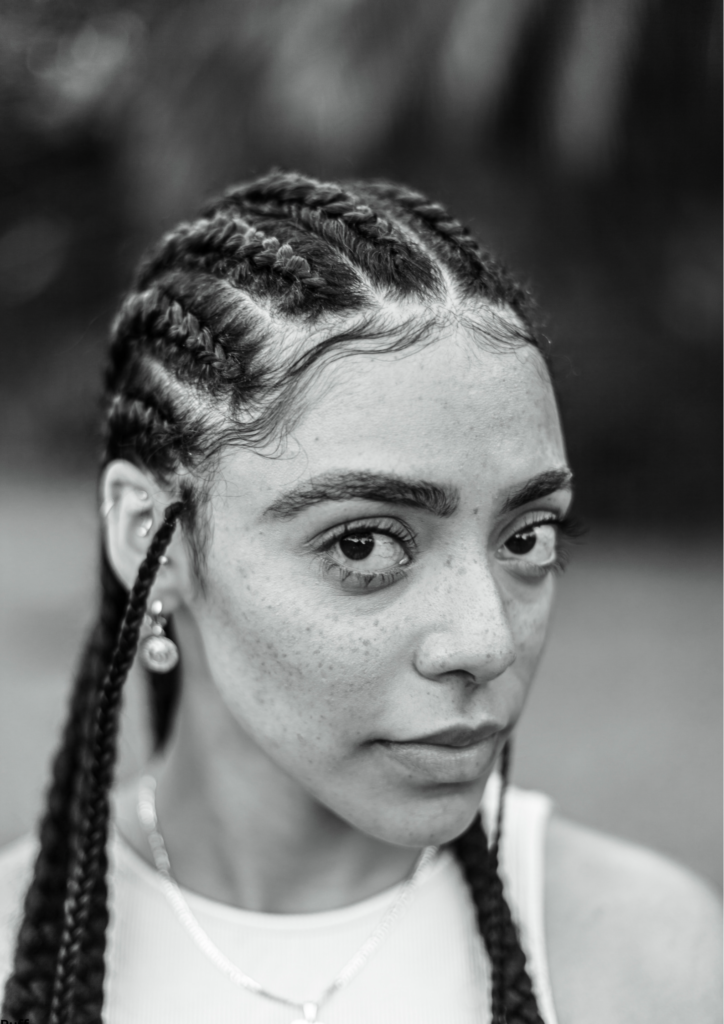
- Bantu Knots
Bantu knots are a versatile style; they are a two-for-one style that can be worn in knots and after they are unraveled.

- Knotless Braids
Knotless box braids are great as a protective style. They allow you to take care of your scalp and are versatile in how you want to style them on a daily basis.

- Afro
Rocking your hair in an afro is truly a one-of-a-kind experience. It requires minimal effort and is truly one of the most beautiful hairstyles out there.
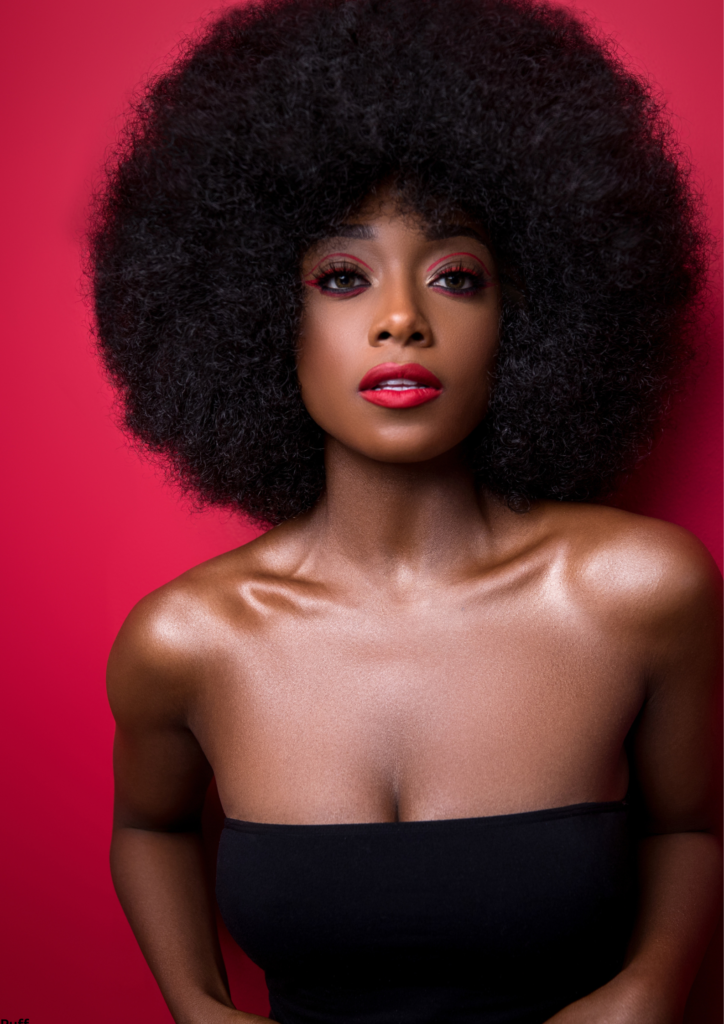
- Crown Braid
This simple yet elegant updo is a perfect, classy hairstyle for special occasions. You can wear it in various ways, as well as accessorize it beautifully.
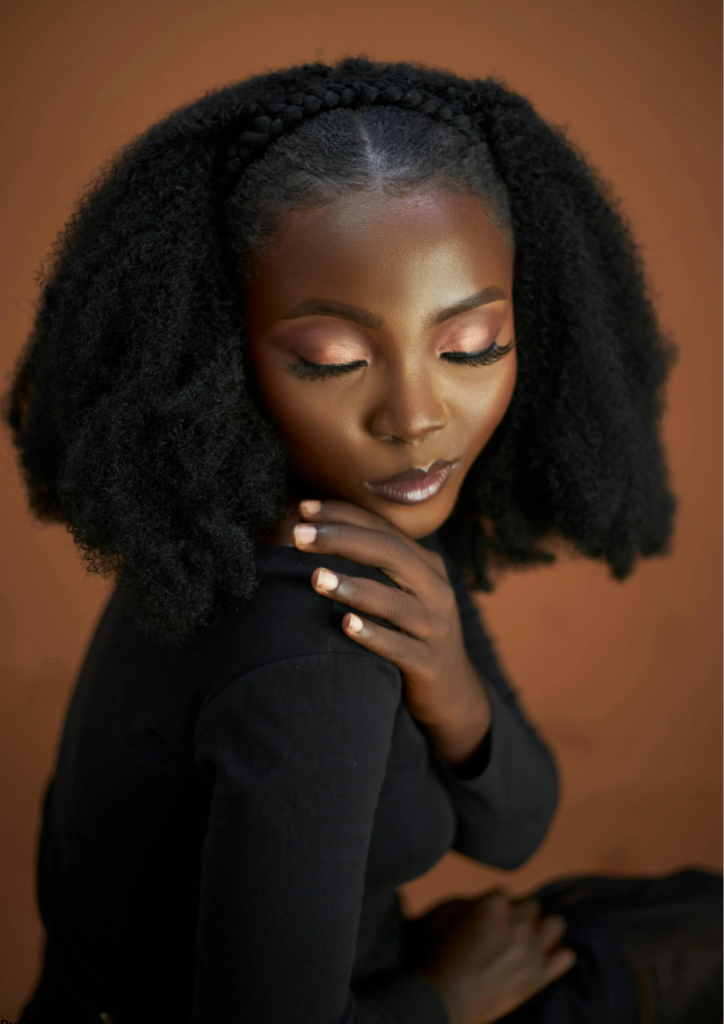
- Faux Locs
Faux locs are a great protective hairstyle for 4c hair. They are lower maintenance than box braids as they tend to look more natural as your hair grows out over time.
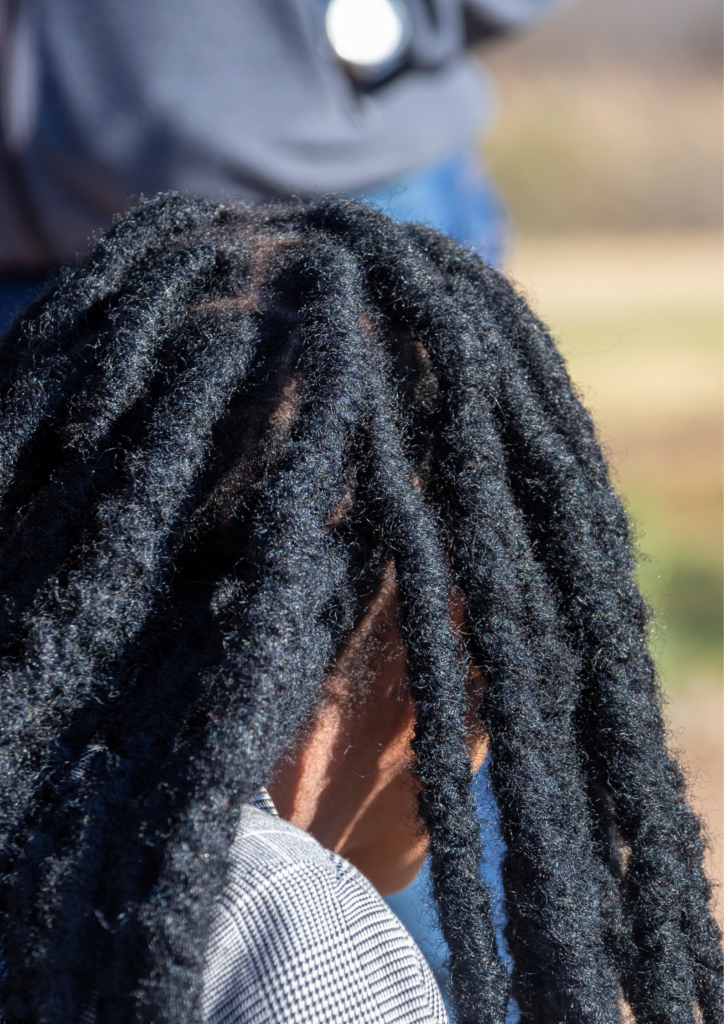
Twist Out
Who does not nottlove a shiny, voluminous twist-out? There are different ways you can do your twist-out. You can go the super-defined coils route or a more fluffy twist-out, which can last for a few days.
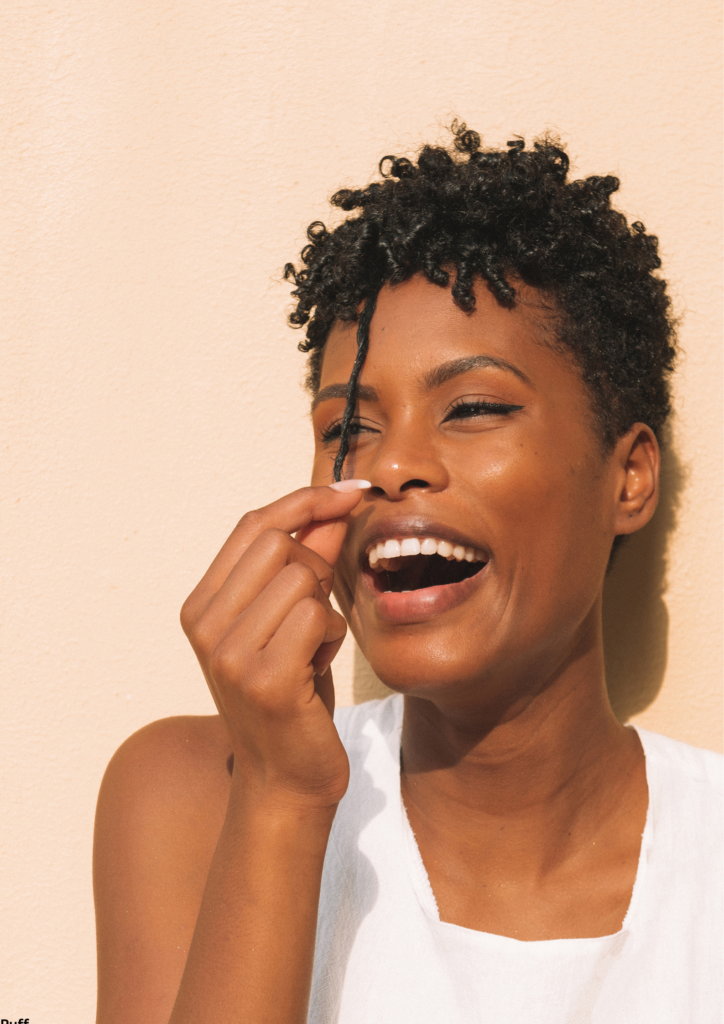
Low-afro puff
Instead of pulling your hair up into a high puff, you are going to sleek down your hair into a low puff at the nape of your neck and secure a puff. This is a versatile hairstyle that is very corporate while showcasing your beautiful 4c hair.
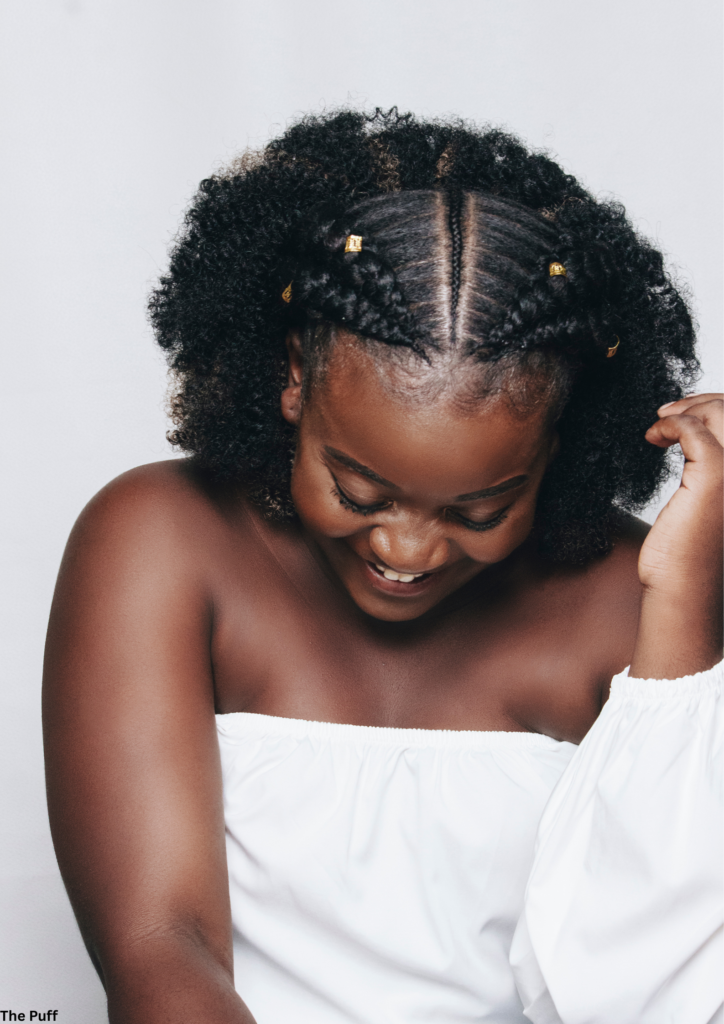
Best Products For Type 4C Hair
Sulfate-Free Shampoo
Type 4c hair typically needs a lot of moisture; therefore, cleansing with a sulfate-free shampoo will help to remove build-up without stripping the hair of its natural oils.
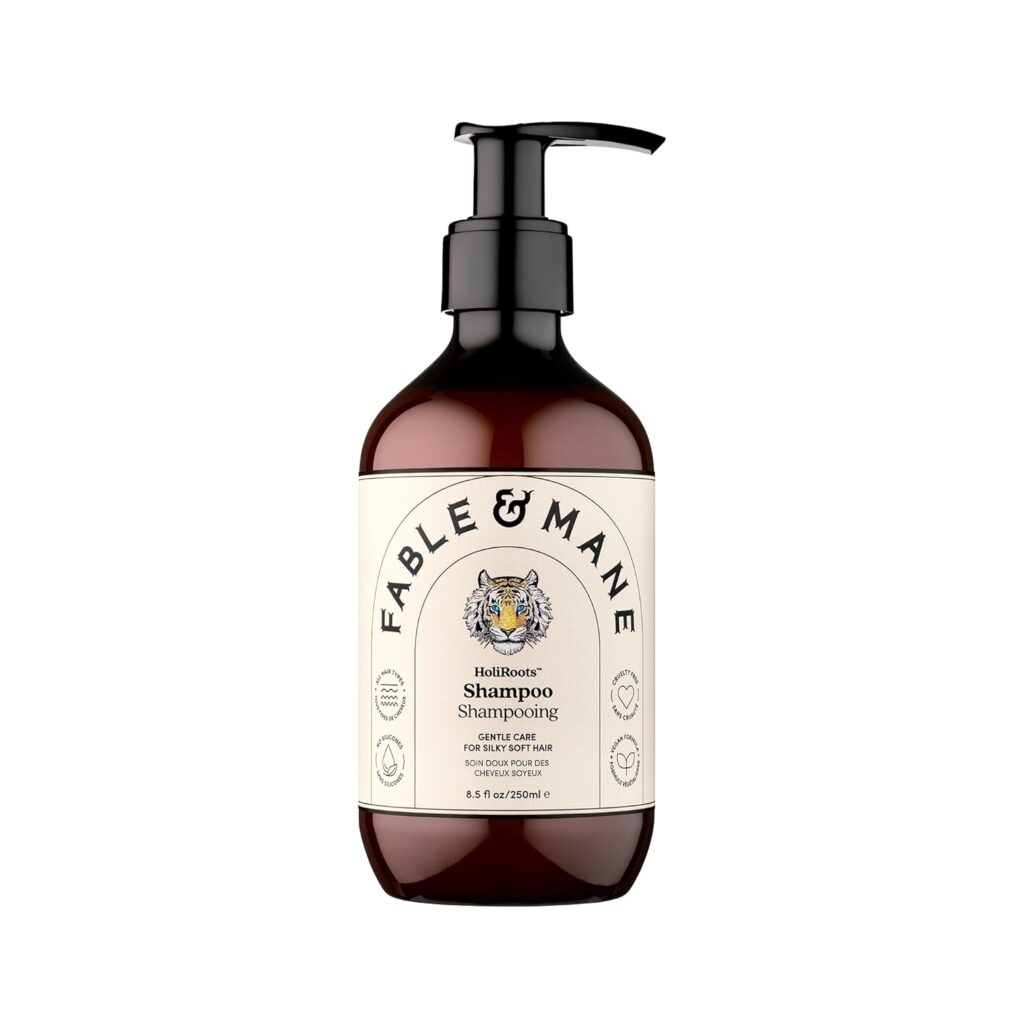
Fable & Mane Hydrating Shampoo moisturizes and cleanses dry, damaged hair with aloe vera and coconut oil. For medium to thick hair types (8.5 fl oz / 250 ml).
A MOISTURIZING SHAMPOO TO HYDRATE AND STRENGTHEN HAIR – experience a soft, cleansed mane with this coconut oil shampoo formulated to clean hair without stripping moisture, leaving your mane feeling silky soft, and your scalp cleansed and hydrated
SUITABLE FOR MEDIUM TO THICK HAIR TYPES – enriched with healing Tiger Herb to calm sensitive scalps, and nourishing Coconut Oil to deeply cleanse and moisturize hair, this hydrating shampoo also contains Aloe Vera for a natural boost of moisture
DELECTABLE SCENT TAKES YOU TO PARADISE IN INDIA – banana and coconut are blended with Indian jasmine sambac, comforting rice milk, and vanilla in this shampoo for dry hair that surrounds you with fruity, floral fragrance every time you wash your hair.
SILICONE-FREE, VEGAN, AND CRUELTY-FREE – perfectly paired with Fable and Mane Holiroots Conditioner, this luxurious clarifying shampoo for women is suitable for colored hair and contains no dehydrating silicones or sulfates.
Moisturizing Conditioner
The best way to combat dryness for 4c hair, is to use a moisturizing conditioner that will detangle your tight coils while hydrating your hair.
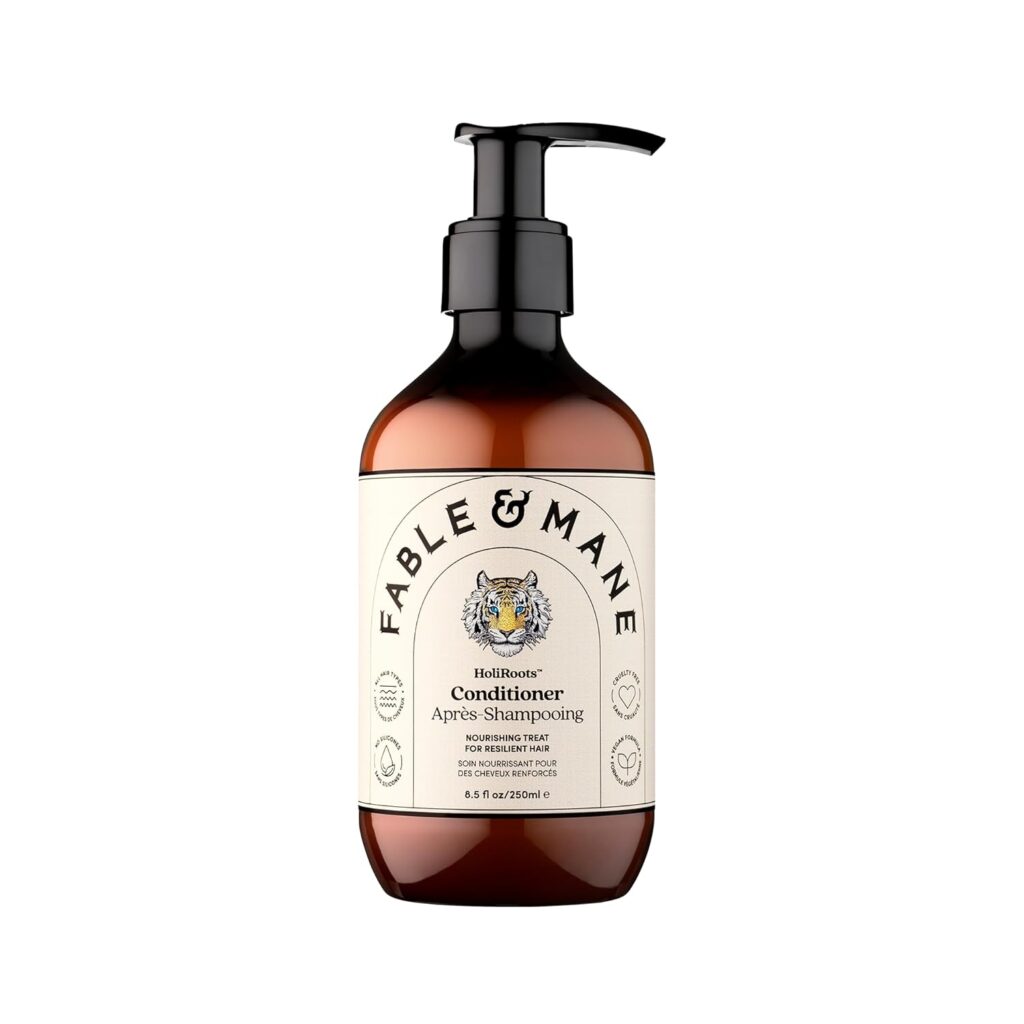
Fable & Mane Holiroots Conditioner for Women – Moisturizing for Damaged, Dry Hair with Turmeric, 8.5 FL oz
- A MOISTURIZING CONDITIONER TO SMOOTH AND DETANGLE HAIR – deeply nourish hair and tame frizz with this miracle hydrator. Enriched with shine-enhancing Turmeric, this conditioner for dry hair works to repair damaged strands for a smooth, glossy finish
- SUITABLE FOR ALL HAIR TYPES – coconut deeply hydrates and smooths strands, while turmeric, an anti-inflammatory golden root, controls hair fall. Infused with Amla, an antioxidant-rich Indian berry, this hydrating conditioner naturally smooths your mane and adds shine
- DELECTABLE SCENT TAKES YOU TO PARADISE IN INDIA – banana and coconut blend with Indian jasmine sambac, comforting rice milk and vanilla in this conditioner for damaged hair that surrounds you with fruity, floral fragrance every time you wash your hair
- SILICONE-FREE, VEGAN AND CRUELTY-FREE – safe for colored hair and free from dehydrating silicones or sulphates, use this hair conditioner for women after Fable and Mane Shampoo as part of your haircare ritual for a nourishing experience from root to tip.
Leave-in Conditioner
A rich, hydrating leave-in conditioner is the right kind of product your 4c hair needs to hydrate your hair without leaving excessive product buildup. Leave-in conditioners are best applied to damp hair after a deep-conditioning treatment. Look for a lightweight formula that will help with frizz as well as not leave any greasy residue.

tgin Sweet Honey Hair Milk and Moisturizer for Natural, Dry, Curly, Wavy Hair – 8 Oz
- Kiss dry hair goodbye and say hello to soft, beautiful moisturized curls with tgin Sweet Honey Hair Milk.
- Infused with raw honey and agave nectar, this lightweight hair milk has the perfect combination of moisture and antioxidants, to help condition and detangle overworked kinky, curly and wavy tresses.
- tgin Sweet Honey Hair Milk protects against damage, split ends, and helps to minimize breakage
- Detangling agents help keep hair soft, smooth, and free from breakage. Great for all hair types!
- Black, Women Owned: Our team at tgin is 96% women and 100% black-owned.
Hair Oil
Hate them or love them, but hair oils are here to stay. A nourishing hair oil helps to moisturize and protect your hair and is also used as a sealant to help lock in moisture. The best oils for hair are olive oil, argan oil, jojoba, and avocado oil, amongst many others.

Plantmade Beard and Hair Strengthening and Growth Oil, Plant Based All Natural Ingredients (Inches, 3.5 ml)
- Made From Plants, For You: Pure & powerful plant-based products to help you reach your unique hair goals
- Stimulate Hair and Beard Growth: Encourage healthier, fuller hair/beard growth with our infusion of clinically proven ingredients and ancient ayurvedic herbs
- Mend and Repair Damaged Hair: Revive and restore the health of your strands by taking advantage of herbs repair damage, rebuild strands and improve the growth and health of your hair
- Reactivate “Sleeping” Follicles: Fill in those bald spots and see growth and volume in thinner areas as Inches can help to reactivate damaged or dormant follicles
- Strengthen Your Scalp, Beard, Skin & Strands: See improved strength and health of your strands and ends and experience reduced shedding and breakage to improve length retention
- Application: To your damp hair, dispense a few drops at a time, either into clean hands before applying or directly onto the scalp using the pipette. Massage the oil into scalp and strands.
Deep Conditioner
Deep conditioners are an absolute must for type 4c hair. A deep conditioning treatment provides long-lasting moisture and nourishment for the hair. It pampers the hair by softening the cuticle to penetrate the hair and leave it soft and hydrated. Avocado, honey, and shea butter are some of the best ingredients to look for in a deep conditioner.
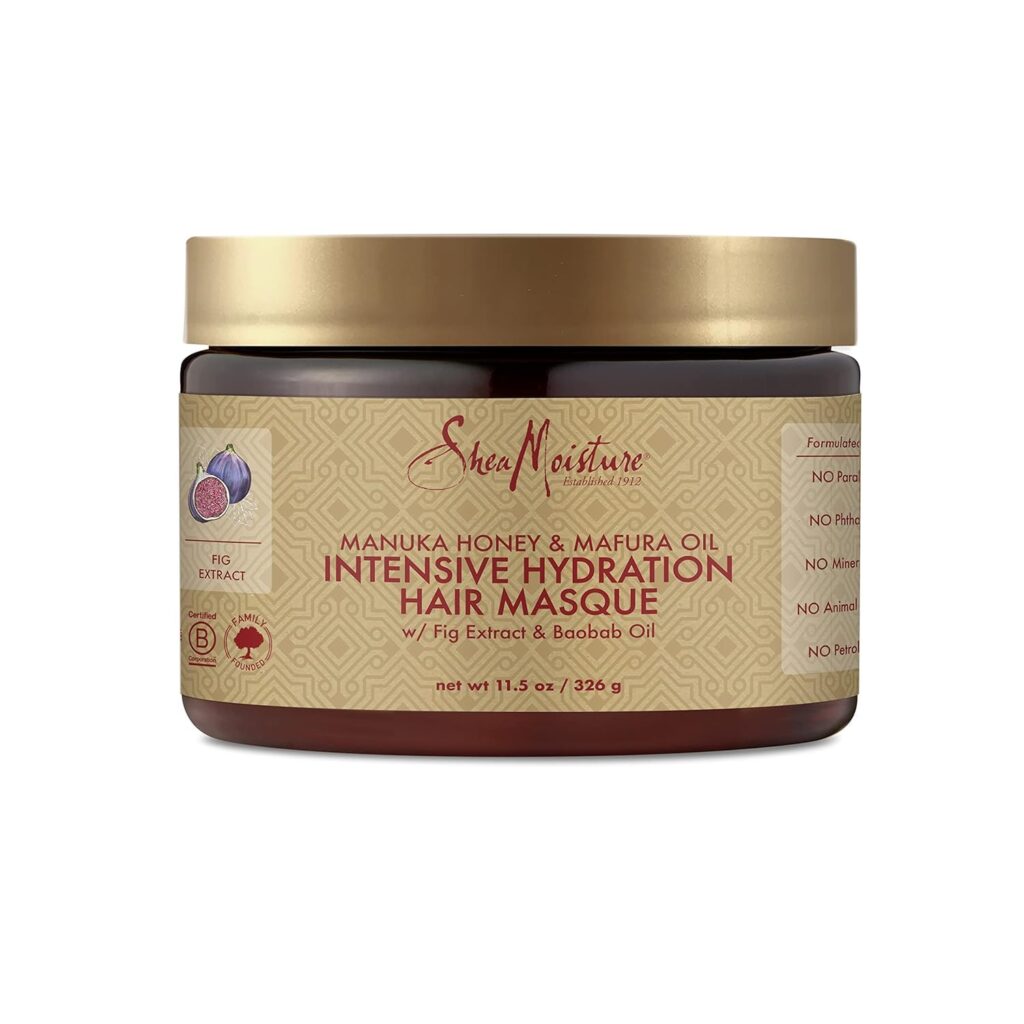
SheaMoisture Intensive Hydration Hair Masque Manuka Honey & Mafura Oil For Dry, Damaged Hair Deep Conditioning Hair Treatment 11.5 oz
- SheaMoisture Intensive Hydration Hair Masque infuses hair with a powerful dose of moisture and provides intense conditioning for hair that is thirsty for moisture, especially curly hair
- This deep conditioning hair masque fortifies follicles and smooths over-processed hair, damaged hair or color-treated hair for stronger, healthier and frizz-free hair
- This deep conditioning hair treatment masque blends certified organic Shea Butter, Honey, Mafura and Baobab Oils with antioxidant-rich African Rock Fig to restore and lock in moisture
- Apply this deep hair conditioner generously on clean, wet hair. Use a wide tooth comb to distribute the hair masque evenly from root to ends. Leave in for 5 minutes. Rinse thoroughly
- All SheaMoisture hair products, like this deep conditioning masque, are ethically traded, sustainably produced and cruelty-free
- This intensive hydration hair mask is formulated with no sulfates, no parabens, no phthalates, no mineral oil, no animal testing and no petrolatum
Protein Treatment
A protein treatment helps to repair and strengthen your hair. If you have thin, high porosity type 4c hair in particular, a protein treatment is an absolute must! Protein treatment masks help to strengthen hair and prevent breakage, frizz, and tangling. Look for hair masks with keratin, collagen, and amino acids. Remember not to overdo it with protein treatments and to use them at least once or twice a month.
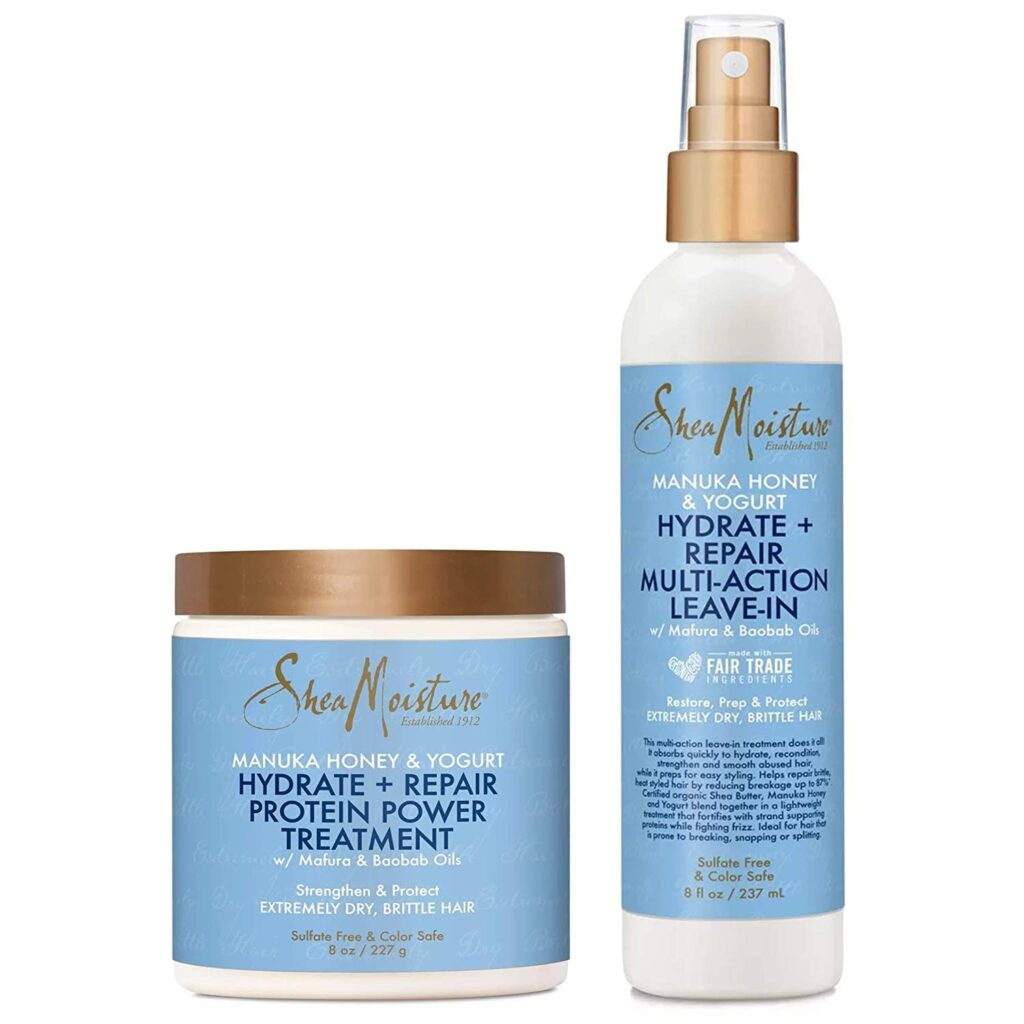
SheaMoisture Manuka Honey & Yogurt Hydrate + Repair Bundle – Protein Power Treatment & Multi-Action Leave-In Conditioner, 8 Oz Ea (2 Piece Set)
- HAIR REPAIR TREATMENT: Reduce hair breakage by up to 76% in just one use of the Hydrate + Repair Protein Power Treatment Hair Mask. The Multi-Action Leave-In Conditioner reduces breakage by up to 87%.
- HAIR STRENGTHENING PRODUCTS: These sulfate-free hair products fortify damaged hair and add shine with real yogurt, certified organic Fair Trade shea butter, mafura, baobab, and other nourishing oils.
- MOISTURIZING HAIR CARE: The ultra-hydrating formulas are infused with moisture-attracting glycerin, Manuka honey, and Vitamin E for healthy hair that’s easy to style.
- ANTI-FRIZZ HAIR PRODUCTS: For an effective split ends treatment, apply the mask to cleansed hair and leave it on for 10-15 minutes before rinsing. Follow up by combing generous amounts of leave-in conditioner through your hair.
Styling Products
A curl enhancer cream, hair serum or curl spray, are some the styling products you will need for type 4c hair. Styling products help to define curls, reduce frizz and itchiness, as well as add shine to your hairstyle. Make sure you choose products that will not only protect your protective styles but also keep it hydrated.
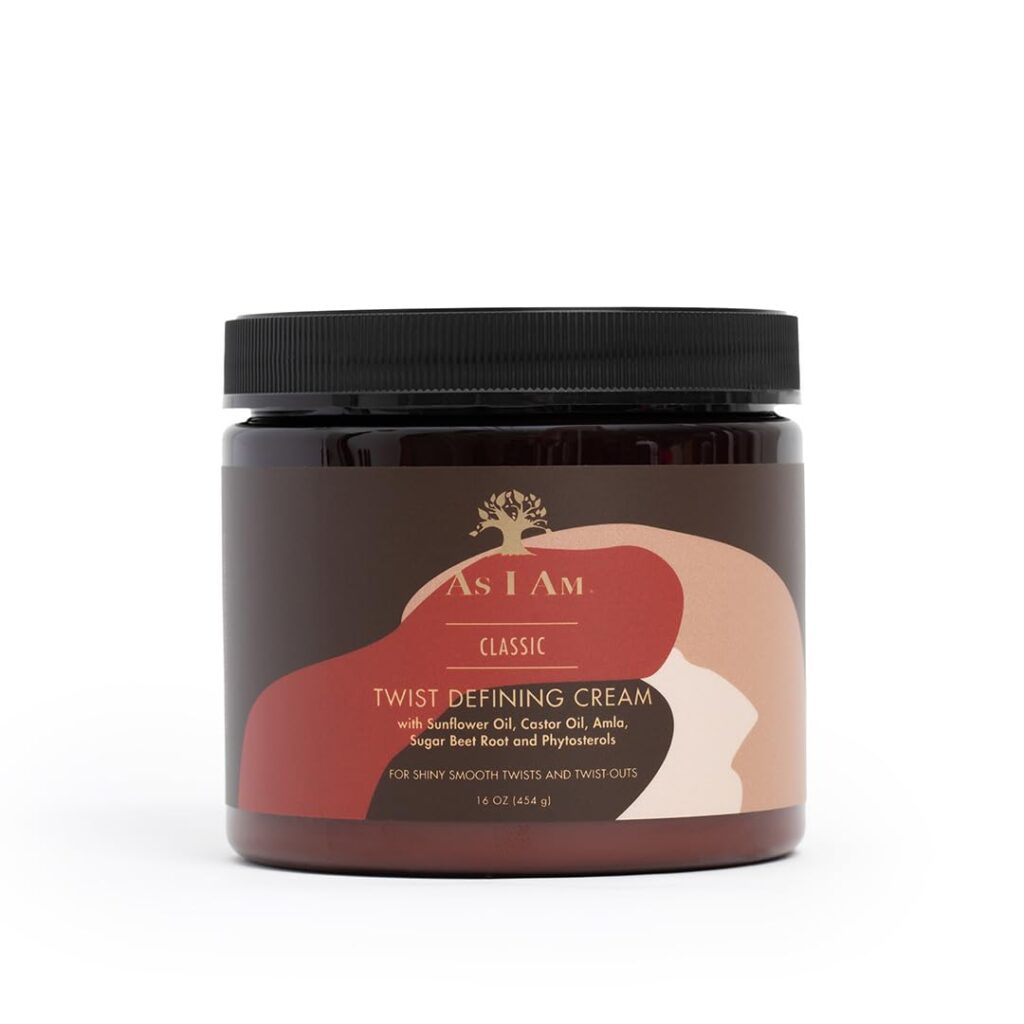
As I Am Twist Defining Cream Red, 16 Ounce
- Country of origin is United States
- The package weight of the product is 16 ounces
- Produces strong, lasting definition
- The package dimension of the product is 3″L x 3″W x 6″H
- Hair type: Curly
Ingredients to Look For And Ingredients to Avoid
Ingredients To Look For:
Avocado Oil
Rich in nutrients and fatty acids, avocado oil helps to nourish and moisturize 4c hair. It helps to improve elasticity and strength in the hair while encouraging growth. If avocado oil is to thick and heavy for your hair, you can mix it with a lighter oil like argan oil and still reap its wonderful benefits.
Honey
Honey is a great hydrating ingredient for your hair. It is a natural humectant that provides your hair with plenty of hydration and helps to retain moisture in your hair.
Aloe Vera
Aloe Vera is a humectant that is very beneficial for 4c natural hair. Aloe vera helps to strengthen the hair and stops hair breakage which is good for 4c hair. Aloe vera is also an effective treatment to soothe and nourish the scalp especially when experiencing dandruff.
Tea Tree Oil
Tea tree oil is an eessential oil that has been used for centuries for its medicinal properties. tea tree oil is frequently used to help improve circulation and reduce the growth of harmful bacteria and fungi on the scalp. It also helps soothe dandruff and other scalp conditions that can lead to hair loss or discomfort.
Amino Acids
Amino acids are building blocks of protein that help to repair and strengthen your hair. They help to prevent breakage and also protect against free radical damage. Amino acids can help to type 4c hair to retain moisture better by improving the hair’s ability to absorb and hold water.
Panthenol
Panthenol is a form of vitamin B5 that helps to lock in moisture and protect your hair from damage. Panthenol can help soothe an irritated scalp and reduce dandruff and itchiness.
Ingredients to Avoid:
Sulfates
Sulfates are harsh cleansing agents that are often found in shampoos. They strip oil and dirt out of your hair, However they strip your hair of its naturally produced sebum, that is meant to moisture your hair.
Sulfates To Avoid:
Sulfates are harsh detergents that can strip natural oils from the hair and scalp, leading to dryness and irritation.
- Sodium Lauryl Sulfate (SLS)
- Sodium Laureth Sulfate (SLES)
- Ammonium Lauryl Sulfate (ALS)
- Ammonium Laureth Sulfate (ALES)
- Sodium Myreth Sulfate
Replace With:
- Cocamidopropyl Betaine (derived from coconut oil)
- Decyl Glucoside (plant-derived)
- Sodium Cocoyl Isethionate (gentle, coconut-based)
- Sodium Lauroyl Methyl Isethionate (mild cleanser)
- Lauryl Glucoside (from coconut or palm oil)
Parabens
Parabens are preservatives that are used in natural hair products to increase a product’s shelf life. Parabens are harmful your hair as they can cause irritation, dryness and breakage, alongside other health concerns.
Parabens to Avoid
Parabens are preservatives that may disrupt hormones and can irritate the scalp.
- Methylparaben
- Ethylparaben
- Propylparaben
- Butylparaben
- Isobutylparaben
- Isopropylparaben
Replace With:
- Benzyl Alcohol (naturally derived from plants)
- Sodium Benzoate (safe preservative)
- Potassium Sorbate (food-grade preservative)
- Rosemary Extract (natural antioxidant)
- Vitamin E (Tocopherol) (preservative and conditioning agent)
Silicones
Silicones like dimethecone is a popular ingredient commonly used in haircare products to control frizz and add slip to a product. However, silicones create a water barrier and prevents absorption of water, which can essentially dry out your hair, which would require you to use harsh sulfates to remove it, looping you in a cycle you do not need for your fragile type 4c hair.
Silicones to Avoid
Silicones can create buildup and prevent moisture from penetrating the hair shaft.
• Dimethicone
• Cyclopentasiloxane
• Cyclohexasiloxane
• Amodimethicone
• Phenyl Trimethicone
• Dimethiconol
• Cetyl Dimethicone
• Trimethylsiloxyamodimethicone
Replace With:
• Argan Oil (lightweight, adds shine)
• Jojoba Oil (mimics natural scalp oils)
• Shea Butter (deeply moisturizing)
• Aloe Vera (hydrating, non-greasy)
• Bamboo Extract (adds strength and shine)
Alcohols
Certain alcohols, especially drying alcohols like ethanol, isopropyl, are common in styling products. They re also known to moisture from your curls, which then dries out your hair and scalp leading to irritation and breakage. Additionally, alcohols also contribute to making your hair frizzy. Though you should steer clear of these drying alcohols, not all alcohols are bad, just look for moisturizing alcohols like cetyl, stearyl and cetearyl alcohols which help in retaining moisture.
Drying Alcohols to Avoid
Some alcohols can dry out the hair, leading to brittleness and breakage.
• Isopropyl Alcohol
• Ethanol
• SD Alcohol
• Denatured Alcohol
• Benzyl Alcohol (when used excessively)
• Propyl Alcohol
Replace With:
• Fatty Alcohols (Moisturizing):
• Cetearyl Alcohol
• Cetyl Alcohol
• Stearyl Alcohol
• Natural Humectants:
• Glycerin
• Honey
• Aloe Vera
Synthetic Fragrances
Synthetic fragrances can a mix of chemicals like pthalates are not listed on the label. These chemicals can be potentially harmful to both human health and the environment. They are especially problematic with sensitive skin and allergies as they can cause irritation which can cause symptoms such as itching, redness and flaking.
Synthetic Fragrances to Avoid
Synthetic fragrances can contain allergens and irritants that may trigger sensitivities.
• Fragrance/Parfum (generic term covering thousands of chemicals)
• Synthetic Musk Compounds
• Phthalates (often used in fragrances)
• Limonene, Linalool, Citronellol (if synthetically derived)
Replace With:
• Essential Oils:
• Lavender Oil (calming)
• Peppermint Oil (invigorating)
• Tea Tree Oil (cleansing)
• Botanical Extracts:
• Chamomile Extract (soothing)
• Rose Water (light, floral scent)
• Natural Fragrance Blends (clearly labeled as natural)
Tips for Choosing Clean Hair Care:
1. Read Labels Carefully: Look for products labeled as “sulfate-free,” “paraben-free,” and “silicone-free.”
2. Opt for Plant-Based Ingredients: Ingredients derived from natural sources are generally gentler.
3. Avoid Vague Terms: Terms like “fragrance” or “perfume” can hide synthetic chemicals.
4. Choose Certified Brands: Brands with certifications like “Cruelty-Free,” “Organic,” and “Non-Toxic” tend to be more transparent.
Mistakes To Avoid With Your Type 4C Hair
Ignoring the Scalp
Neglecting your scalp is the most detrimental mistake you can make when it comes to the health of your hair, because a healthy scalp equals to healthy hair. Make sure you cleanse, exfoliate and massage your scalp properly and on a regular basis to ensure healthy hair growth.
Not Moisturizing Regularly
4c hair tends to be drier and more prone to breakage than all the other hair types. It is important to keep your hair hydrated. Neglecting proper moisture will only lead to dryness, breakage, frizzy and dull hair. Deep conditioners and leave-in conditioners are the best products to make sure your hair well moisturized, which will make your hair more manageable and soft.
Excessive Heat Styling
Excessive heat styling can damage your 4c hair. High heat can strip your hair of its natural moisture, which can then lead to dryness, breakage and heat damage. Limit heat styling by opting for heat styling like Bantu knots or braids. Should you need decide to apply heat to your hair, ensure you shield your hair with heat protectant.
Overloading On Styling Products
Applying an excessive amount of products can weigh down your hair, leaving it greasy nd prone to buildup. Product buildup can cause your hair to look stiff and also offset your moisture levels and cause harm to your hair. It is important to use products sparingly and choose light-weight formulas that won’t suffocate your hair strands.
Tight Hairstyles
Hairstyles that are too tight can do more damage than good to your hair. I know we love a cute sleek pony and knotted box braids for that vacation, however doing these hairstyles for regularly and for a long period of time can actually cause breakage and tangles to your hair. Try more low-tension hairstyles that don’t require excessive tugging and pulling. See the hairstyles section for the best hairstyles suited for type 4c hair.
Avoiding Regular Trims
Regular trims are a necessity for healthy hair. Regular trims help to remove split ends that can travel up the hair shaft and cause damage. Trims also keeps breakage at bay and minimizes damage to help your hair grow healthier and stronger.
Over washing Your Hair
Over washing 4c hair can be a recipe for disaster. This is because 4c hair is naturally prone to dryness due to sebum not being excessive. Those with type 4c hair do not have to wash their hair as frequent. It is recommended to wash your hair every 2-4 weeks depending on your lifestyle.
Recommended Hair Care Routine
Scalp Care
A healthy scalp is essential for promoting healthy hair growth. Incorporating regular scalp massages into your hair care routine can make a significant difference. Scalp massages help stimulate hair follicles by boosting blood circulation and releasing natural oils that nourish your hair. Additionally, detoxing and exfoliating your scalp are crucial steps to remove product buildup, residue, and impurities that can block hair growth. Prioritizing scalp care will support stronger, healthier hair in the long run.
Pre-poo
Pre-poo is an essential step in your haircare routine. It helps to keep 4c hair moisturized by adding an extra layer of moisture before shampooing. This helps to reduce moisture loss during the wash day process. Flaxseed gel is a great pre-poo and detangling solution.
Shampoo
Even though you do not need to wash your hair every week, it is important to cleanse your hair really well on chosen wash days. Opt for a sulfate-free shampoo that is going to remove all dirt and impurities without stripping the hair of its moisture. Try to shampoo (cleanse) your hair every 2-4 weeks and always wash your hair in braided sections to reach the scalp easier. (watch beautosal for a proper 4c haircare routine)
Condition + Co- Wash
Conditioning your hair after shampooing is vital because it is the step you reintroduce hydration back into the hair. You can also use conditioner as a co-wash on days when you need a wash but not enough to cleanse.Coat your hair thoroughly with conditioner and massage well before rinsing out.
Rinse
Apple Cider Vinegar or tea rinses (green, hibiscus tea) can be very beneficial for 4c hair. Tea rinses can help retain more hair on your head, soothe the scalp and promote healthy growth. Rinses are also good to ensuring that you wash out your shampoo and conditioner well. Green tea, Hibiscus, Apple Cider Vinegar, Peppermint and Lavender tea are great for rinsing out the hair. Do this step after shampooing and conditioning.
Deep Condition
Deep conditioning is applying a generous amount wa hair mask or conditioner and leaving it on for 15-30 minutes under a steaming cap or hood to ensure the product penetrates the hair shaft deeply and supply it with necessary nutrients. Deep conditioning is very important for your natural hair routine and you should be doing it at least once a week to add moisture and reduce frizz.
Leave-in Conditioner
Leave-in conditioners are an absolute must for your type 4c hair routine. Even after wash days, you still need to keep your hair hydrated and the best way to do that is applying a leave-in conditioner to prevent your hair from becoming dry and brittle.
Hair Oils
Hair oils are often used to seal in moisture in your hair. Hair oils can be nourishing and hydrating to the hair. Hair oils can also prevent breakage and frizz from plaguing your hair by keeping the moisture from the leave-in sealed in. Argan, jojoba, grapeseed and olive oil are some of the best hair oils for type 4c hair.
Protective Style
Protective styling your hair into braids, cornrows, threading or twists can help to minimize hair breakage and manipulation. Just always make sure your protective styles are low manipulation and are not too tight to retain length and avoid breakage.
Protect Your Hair While Sleeping
Sleeping in a silk/satin bonnet or pillow case can help you retain moisture and prevent breakage from the friction that happens when you toss and turn while sleeping.
Lifestyle Habits For Healthier Type 4C Hair
Nutrition
Just like a healthy scalp being the foundation of healthy hair, nutrition is going a step further and caring for your hair from within. The food you eat significantly influences the health of your hair. Incorporating protein, biotin, vitamin E, and omega-3 fatty acids into your diet can help keep your hair strong and vibrant. Protein is especially important, as it forms the building blocks of your hair, helping to maintain its strength and resilience. To support overall hair health, aim to consume a balanced variety of nutrients rather than focusing solely on a few specific foods.
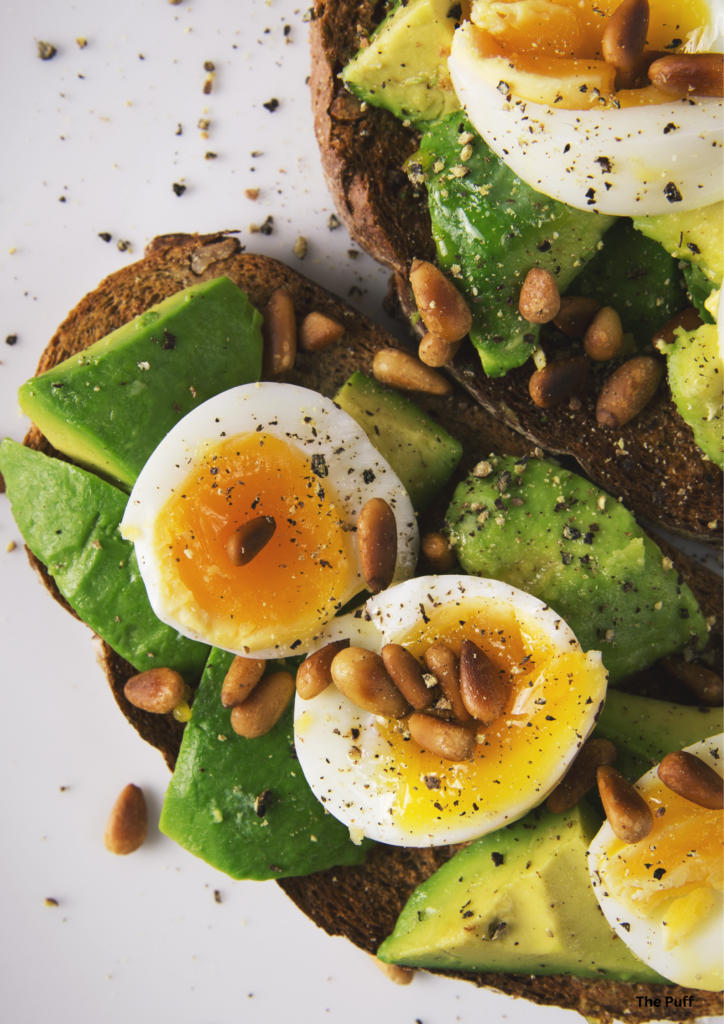
Drink Enough Water
Drinking water is vital for healthy 4c hair because it keeps your hair strong and hydrated. Dehydration can stop hair growth and cause split ends. Your hair needs moisture and whenever you don’t drink enough water, you can cause your hair to become dry and brittle, essentially hindering the growth of your hair.
Exercise
Exercising is very beneficial for hair health, when you exercise you can improve the health of your hair by increasing blood circulation, which helps deliver more oxygen and nutrients to the hair follicles. When blood circulation increases to the scalp, more nutrients and oxygen reach the scalp which is crucial to cell regeneration and optimal hair growth. Exercise also reduces stress which leads to reduced hair loss.

Sleep
Sleep is essential for many aspects of your well-being, but its impact on healthy hair is often overlooked. Getting enough quality sleep allows your body to function more efficiently, including supporting hair strength and vitality. During sleep, your cells have time to repair and regenerate, leading to stronger, shinier hair with reduced breakage. This is partly due to an increase in collagen production while you rest.
To maximize these benefits, it’s important to establish a proper sleep routine and take care of your hair while sleeping. This includes protecting your hair at night and avoiding sleeping with wet hair.
Relax
A healthy lifestyle is one of the most important factors of healthy hair, and taking the time and effort to reduce stress, tension and anxiety can be beneficial for your hair. Stress is a major component in hair loss, therefore it is important you engage in activities or hobbies that help you to reduce stress, such as spending time with your loved ones, eating, exercising and sleeping well.
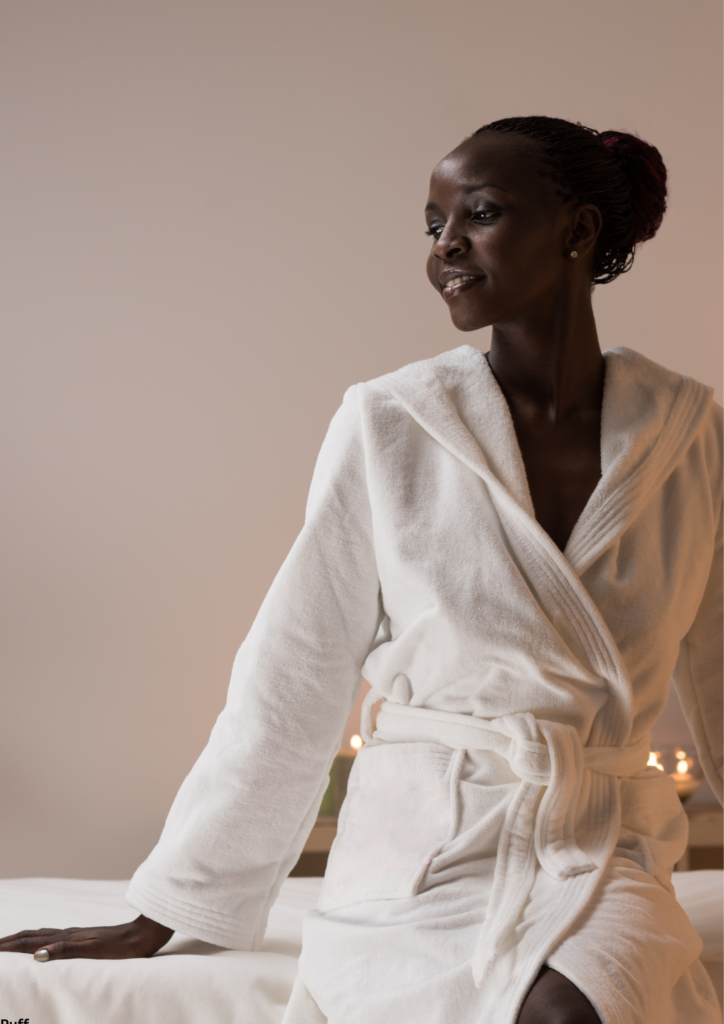
Sun Protection
Just like your skin, your hair also needs protection from the sun! Yes even you my melanated 4c hair babe. The sun’s UV rays can break down proteins, causing your hair to weaken and lead to dry, brittle hair.So use UV-protecting products and wear your sun hats. Grapeseed, sesame, raspberry seed oil and zinc oxide are some the natural ingredients to look for, when lookinng for a more natural sunscreen.
Use the Right Products
This is a very crucial step in your haircare routine, it will change everything. Type 4c hair is naturally very dry and prone to breakage. Therefore it requires special attention as well as products that are specifically formulated for this hair. 4c hair needs products tht are deeply nourishing and moisturizes well. These products should help you maintain healthy hair and also keep frizz, dryness and brittle hair at bay.

Use the Right Accesories
Hair accesories are great for adding a little sparkle, color and interest in your hairstyles.Accesories can also be functional for everyday use such as holding your hair in place. We know that some accesories can tangle your hair and cause breakage. Make sure you use silk/satin scrunchies, claw clips and headbands to minimize damage.
Conclusion
Caring for 4C hair is all about understanding its unique needs and treating it with the love and attention it deserves. With the right products, techniques, and a bit of patience, 4C hair can be a stunning representation of natural beauty. Embrace your texture, experiment with styles, and remember that your natural curls are a powerful expression of individuality. By learning to love and care for your 4C hair, you’ll not only achieve healthier hair but also gain confidence in your natural beauty.
- Longevity Foods: What Ancient Civilizations Ate for Vitality & Strength
- How Seasonal Living Boosts Healthspan: Eating, Moving, and Resting with the Seasons
- Longevity as a Lifestyle: How to Live Longer, Healthier, and More Vibrantly
- The Secret to Longevity: How to Live Longer, Healthier, and Happier
- The Ancient Head-to-Toe Self-Care Ritual for Longer Hair & Glowing Skin (Inspired by Timeless Beauty Traditions)
References:
https://latoyaebony.com/what-real-4c-hair-looks-like
Leave a Reply